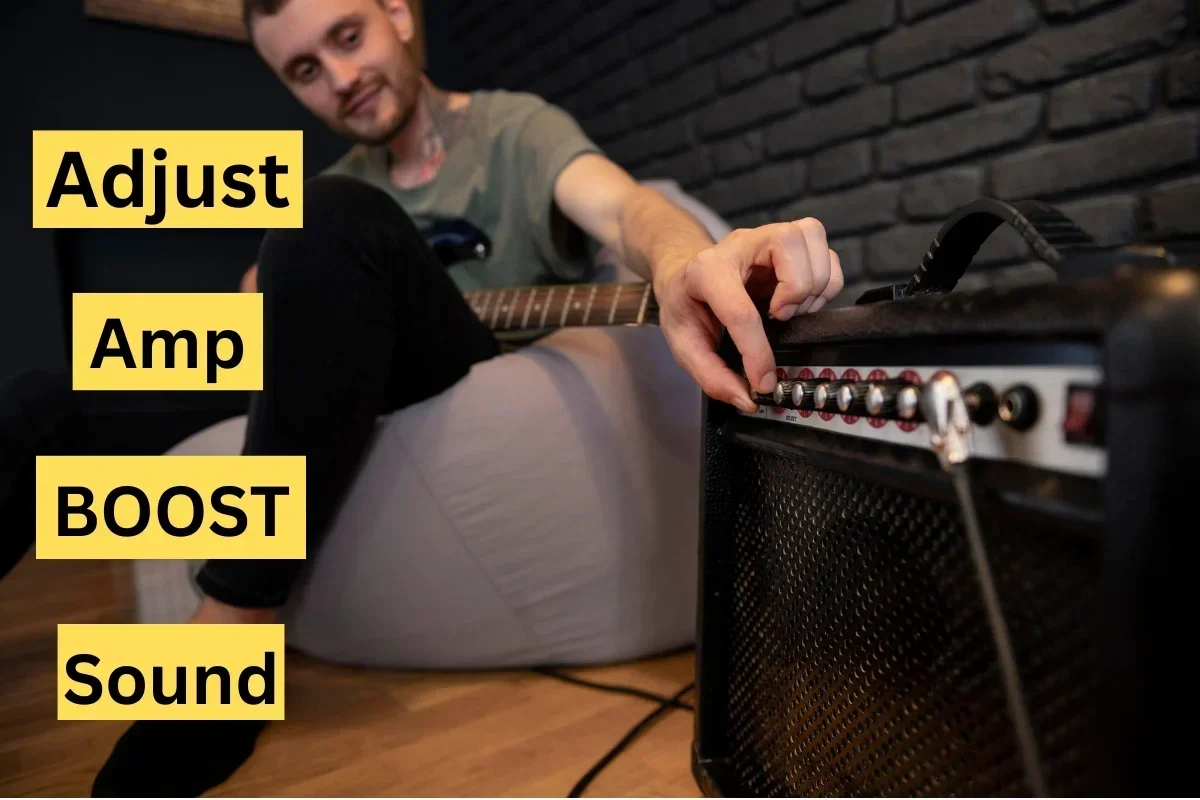Why does My Guitar not Sound loud ?
Is your guitar whispering when it should be roaring?
Many players struggle with guitar sound issues, where their electric guitar or acoustic guitars sound quieter than expected. Problems such as faulty output jacks, amp settings, or electronics are identified and assist in correcting volume drops and recovering full and clear guitar tone.
Having guitar sound issues or volume drops? Book a Zoom Twin Cities session to restore your guitar tone. Play loud, clear, and confident today!
Why Your Guitar May Sound Quiet
There are occasions when your guitar does not sound loud due to problems with the signal of guitar. The acoustic guitars, as well as the electric guitars, may suffer a drop in volume caused by setups, connections, or electronics issues. Knowing these reasons will make you re-establish your guitar sound in seconds and play again.
Loose Output Jack or Cables
The output jack can be loose or worn, and this can severely cut the signal of the guitar, and hence your guitar sounds lower than it should. Even the slightest cable problems can lead to the loss of volume or poor tone of the guitar, particularly with electric guitars. Periodic checking of connections is a way of maintaining a strong and consistent sound of your guitar.
Improper Amp Settings
Incorrect amp settings can make any guitar sound quiet or muddy. Adjusting means the EQ properly ensures your Les Paul or electric guitar projects well. Small changes to the gain, volume, and tone knobs can significantly improve the overall guitar sound.
Ground Wire or Electrical Issues
A faulty ground wire can lead to buzzing or noticeable volume drops in your guitar. Electrical problems can weaken your guitar tone and affect signal consistency. Inspecting and repairing grounding issues often restores full output.
Pickup Height or Guitar Type
Acoustic guitars and electric guitars like Les Pauls may produce lower volume if the pickups are too low or improperly positioned. String gauge and bridge setup also influence the guitar sound. Adjusting pickups and setup can maximize output without altering technique.
Dirty or Worn Electronics
Pots, switches, or connectors that are dirty or worn can degrade the signal from the guitar and cause uneven guitar tone. This often results in fluctuating volume during practice sessions. Cleaning or replacing electronics is an easy fix for long-term performance.
Check Your Output Jack and Cables
A loose or worn output jack can drastically reduce the signal from the guitar, making your guitar sound quieter than expected. Even minor cable issues can cause volume drops or weak guitar tone, especially on electric guitars. Regularly checking connections ensures your guitar sound remains strong and consistent.
Amp Settings Can Affect Guitar Sound
The amp settings are very important to the sound of your guitar; they influence the guitar tone as well as the volume. To make a weak or muffled electric guitar sound like a clear and full-sounding guitar, it can be adjusted by adjusting the mean the EQ, gain, and volume. Dialing in your amp correctly will make your Les Paul or any guitar sound loud and projectile.
Understanding Volume Drops in Electric Guitar
The loss of volume in an electric guitar can be caused by worn pots, low-output pickups, or loose connections. Such problems distort the signal of the guitar, which makes your instrument sound even less than it should. Early detection of the cause will assist in sustaining a good tone of the guitar and performance.
Ground Wire Issues and Buzzing Problems
Buzzing, hum, or even an audible loss of volume in your guitar can be the result of a faulty ground wire. Bad grounding disrupts the signal of the guitar, and your guitar sound is weak or patchy. The ground connection is a simple fix that can be made by fixing or securing the connection.
Acoustic Guitars: When Natural Sound Feels Low
There are times when your acoustic guitar can sound less than you think because of things other than your playing. Factors such as strings, body resonance, and pickup arrangement have the capability of lowering the sound of the guitar and making volume loss conspicuous. These reasons can be understood to sustain a good, crisp guitar sound.
String Quality and Age
Worn or old strings lose their tension and vibrancy, and this lowers the natural guitar sound of acoustic guitars. New, quality strings regain volume, brightness, and uniformity of guitar sound. Frequent maintenance of the strings will guarantee that your instrument will project well when you are practicing or performing.
Body Resonance and Construction
The wood type, body shape, and thickness influence how an acoustic guitar resonates. Poor resonance can make even strong strumming result in volume drops. Knowing your guitar’s construction helps you adjust your playing style for maximum guitar sound.
Pickup or Microphone Issues
Pickup acoustic guitars can have poor output or faulty electronics, which weakens the signal weakened by the guitar. This lowers the tone of the guitar when amplified, and it sounds silent. Better projection is easily fixed by adjusting, repairing, or upgrading pickups.
Playing Technique
Acoustic guitars may sound soft even when they are properly tuned due to light strumming, fingerstyle, or poor attack. The plucking or strumming technique is strengthened to increase the natural sound of the guitar. The use of the correct technique and setup adjustments will avoid unwanted volume drops.
Environmental Factors
Wood resonance and general guitar tone may be influenced by humidity, temperature, or placement. Extreme conditions can reduce vibrations and decrease guitar sound. The stability of the environment assists your acoustic guitar to be fully projected in a consistent manner.
Les Paul and Other Electric Guitars: Unique Volume Challenges
The pickups, electronics, or the setup of electric guitars, such as a Les Paul, can cause a loss in volume. Minor changes to pickup height, wiring, and potentiometers have a great influence on the signal of the guitar. By dealing with these factors, there will be ga ood and stable guitar tone during practice and performance.
Pickup Height Adjustment
When the pickups on your Les Paul are too low, they will not pick up enough of the vibrations of the strings, and the signal will be weakened by the guitar. An increase in the pickups enhances the magnetic pull on the strings, increasing the volume and clarity. The correct pickup height achieves the maximum output without undesirable distortion and provides a full guitar sound.
Worn or Dirty Electronics
Pots, switches, and internal wiring may wear out and cause scratchy sounds or a sudden drop in volume. Washing contacts or changing worn-out parts restores a stable signal of the guitar and a smooth guitar sound. Frequent service eliminates irritating problems during practice or live performances.
Pickup Selection and Type
Various pickups, such as humbuckers and single coils, have varying levels of output and tonal qualities. The correct pickup selection influences the volume and the tone of the guitar, with some pickups potentially being quieter with some amp settings. Knowing pickup variations will enable you to optimize guitar sound to your style of playing.
String Gauge and Setup
Heavy strings tend to be more productive, and light strings can sound weaker and influence the signal of the guitar. Tilting of the string gauge, action, and intonation are done to guarantee maximum vibration transfer to pickups. This enhances the sound of the guitar and reduces the reduction of the volume, giving your Les Paul a steady, rich sound.
Amplifier Compatibility
A perfectly set-up Les Paul can sound weak even when the amp has not been set up correctly. To match your guitar output, the EQ, gain, and volume settings are appropriate to make sure that you have the full guitar sound. Experimenting with various channels and settings will enable you to keep your head straight and strong in practice and performance scenarios.
Simple and Easy Fixes for Loudness Problems
Simple adjustments and DIY fixes can solve many of the problems with the volume drops or weak guitar sound. The acoustic guitar and the electric guitar players can both regain the clear and full guitar tone without the assistance of a professional. These simple steps can be understood to ensure the continuity of performance and fun practice.
Tighten the Output Jack and Cables
Make sure your output jack is fixed and the cables are correctly fitted because loose connections dilute the signal of the guitar. Lost guitar sound can be regained in a short time, even with small adjustments. An easy way to fix this is to check these connections regularly, both on the part of beginners and intermediate players.
Adjust Amp Setting
Fine-tuning: You can immediately make your amp sound better by adjusting the EQ, gain, and volume. Minor adjustments can remove silenced or muted output and avoid decreases in volume. One of the simplest methods of optimizing the sound of the guitar at home is to learn the basic amp controls.
Replace Worn Strings
Acoustic guitar or electric guitar strings can be old or of poor quality, which decreases the output and mutes the guitar tone. Replacing strings after a short period of time brings back the brightness, projection, and powerful sound of the guitar. It is among the simplest and most successful DIY solutions.
Clean Electronics
Worn or dusty pots, switches, and connectors may attenuate the signal of the guitar and result in an uneven guitar sound. Washing using the right equipment or changing parts is a simple solution. Good maintenance results in a smooth volume and trustworthy sound of the guitar.
Check Pickup Height and Setup
The signal of the guitar can be significantly improved by raising or lowering the pickup height or the bridge configuration. Correct installation enhances the sound of the guitar and also the volume, eliminating the decrease in volume. This is an easy change that is not usually considered but is very effective.
When to Call a Professional Guitar Technician
In some cases, even after you have done some simple solutions, your guitar might still have low volume or a poor guitar sound. Problems such as damaged electronics, pickups, or wiring issues are the ones that need the attention of a professional. Hiring a guitar technician will help to guarantee that your electric guitar or acoustic guitars are playing at full guitar sound and that no additional damage is caused.
Conclusion
Maintaining a strong guitar sound requires regular checks, proper amp settings, and consistent practice. Addressing issues like loose output jacks, worn strings, or grounding problems keeps both acoustic guitars and electric guitars performing at their best. With simple maintenance and attention to guitar tone, you can enjoy a clear, full sound every time you play.



